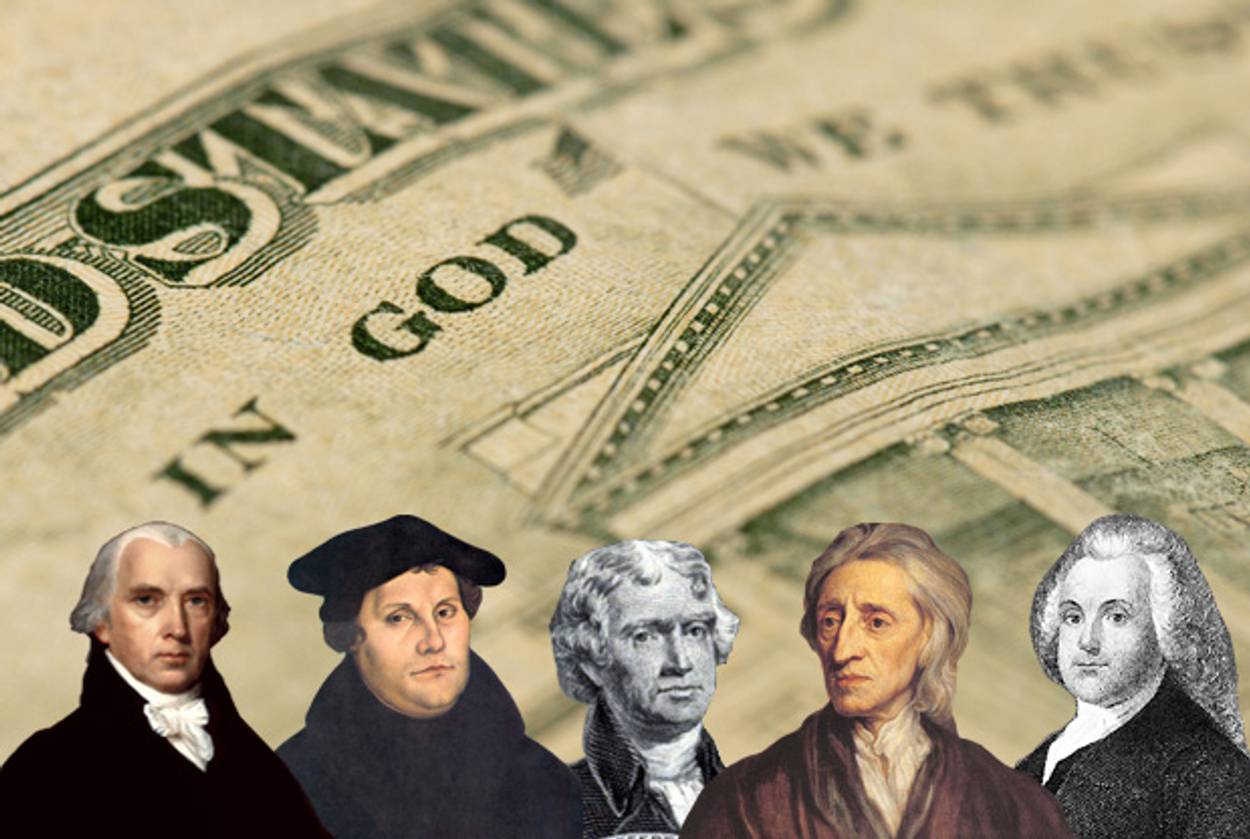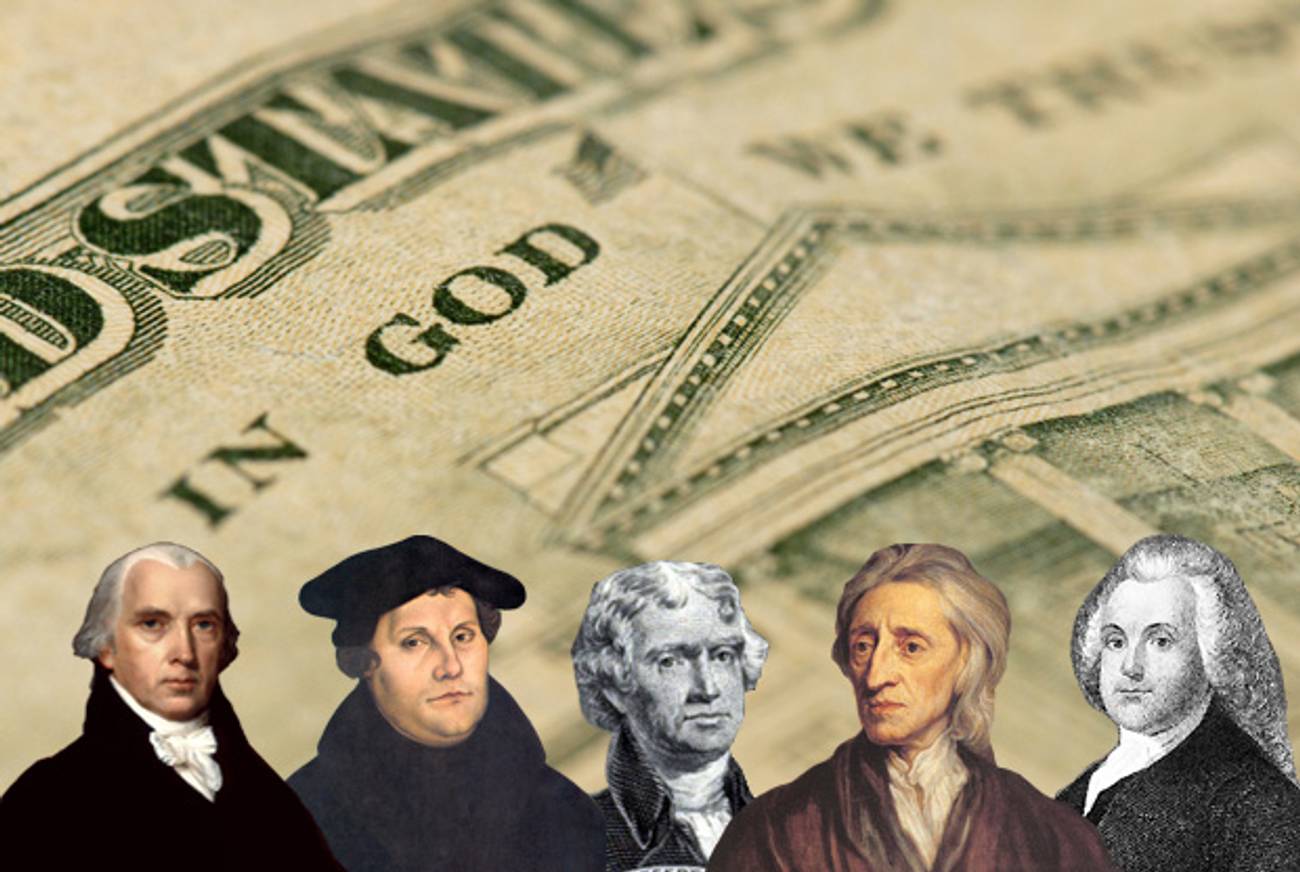The Secular Revival
Jacques Berlinerblau’s book How To be Secular makes a historical case for a strong church-state division




Later this month, as Republicans flock to Tampa, Fla., to crown Mitt Romney their candidate for president, they’ll be greeted by a billboard mocking Mormons for believing that God is a space alien. Democrats, congregating shortly thereafter in Charlotte, N.C., will scarcely enjoy a more hospitable welcome: A sign awaiting them will feature Jesus’ face seared onto a piece of toast, along with the assertion that Christians—a group that includes President Obama, despite vicious and insistent rumors to the contrary—worship a “sadistic God” and a “useless savior.” Both billboards are paid for by American Atheists, an organization that describes itself as “the Marines of free thought.”
Of course, it’s only too easy to find similar vitriol on the other bank of the religious divide: To hear too many Americans tell it, this nation’s pious soul is under constant and vicious attack from those who want to turn it into a smoldering Sodom of late-term abortions, gay marriages, and decadent popular culture.
Both forms of extremism are bad, and both—one by espousing the absolute removal of religion from all recesses of public life, the other by demanding the very opposite—are ruinous to the intricate attempt at liberty that has set America apart from other nations.
In a splendid new book, Jacques Berlinerblau, director of the Program for Jewish Civilization at Georgetown University, warns that the indispensable hedge that keeps church and state apart is being trimmed to within an inch of its existence and that if America is ever to be America again, we must rush to the hedge’s defense.
The hedge Berlinerblau calls by a funny name: secularism. Berlinerblau, who writes frequently and astutely about religion, acknowledges that the concept is difficult to define. As he explains in his book How To Be Secular: A Call to Arms for Religious Freedom, secularism isn’t the same as atheism. In fact, many of its advocates, Jews first and foremost, have defined themselves along secular principles while simultaneously remaining faithful to religious beliefs and traditions. At its core, secularism isn’t a rejection of religion, but rather a political philosophy that “is preoccupied with, and often deeply suspicious of, any and all relations between government and religion.”
But before we join the ranks of those who, like the pontiff, believe that secularism’s end goal is the censoring of religious freedoms, we would do well to consider American secularism’s history. Its founding fathers, Berlinerblau argues, include Martin Luther, John Locke, and Roger Williams—religious men who, even if they never used the term “secularism,” saw the hedge as a necessary precondition for the ultimate religious liberty: the right to worship freely and without intervention. “The care of souls does not belong to the magistrate,” wrote Locke. “The care therefore of every man’s soul belongs unto himself, and is to be left unto himself.” For that to happen, the state’s power must end at the church’s door.
With such theologically intricate roots, secularism was bound to grow more and more tangled. Thomas Jefferson, another of its founding fathers, may have been the tangler-in-chief: The most ardent advocate of separation, his views were, most likely, so out of touch with the majority of his contemporaries that George Washington was urged to acknowledge the discrepancy in his farewell address. “And let us with caution indulge the supposition that morality can be maintained without religion,” said the departing colossus. “Whatever may be conceded to the influence of refined education on minds of peculiar structure, reason and experience both forbid us to expect, that national morality can prevail in exclusion of religious principle.”
It was, perhaps, precisely the peculiar structure of his mind that enabled Jefferson—and, later, James Madison—to kindle the fire of secularism. Centuries later, in a brief golden period ranging from the 1940s to the 1970s, a host of Supreme Court decisions fanned Jefferson’s flames and established secularism as a dominant force in American public life. In a helpful aside, Berlinerblau compares our version of secularism with that practiced in France; while to some the laïcité may look more appealing in its nearly absolutist insistence on separation of church and state, it is achieved at the cost of the state closely supervising religion, which puts the two in a tight embrace. France has a ministry of religions that deems some legitimate and others, like Scientology, not. It also pays for things like Muslim soldiers’ pilgrimage to Mecca. In America, Berlinerblau argues, things are simpler, as our brand of secularism allows the state to keep the church at an arm’s length, granting it the freedom to do as it pleases (tax-free) so long as it does not violate any laws.
It doesn’t take a scholar, however, to know that this blissful vision is everywhere under attack. For at least three decades, a well-organized coalition of religious activists—Berlinerblau calls them Revivalists—has worked to subject the state to church dogma, whether by meddling with textbooks that teach evolution or by vowing to repeal Roe v. Wade. Often, these Revivalists enjoy the majority’s support; what’s secularism to do when its opponents charge it with being undemocratic for opposing the will of the people? Here, Berlinerblau is adamant. Secularism, he argues, is not synonymous with democracy; rather, it is the soil in which democracy is planted. And when that soil is upended by zealots, the state can and must resist. Locke, again, is instrumental here. “It appears not that God has ever given any such Authority to one Man over another, as to compel anyone to his Religion,” the philosopher wrote in A Letter Concerning Toleration. “Nor can any such Power be vested in the Magistrate by the consent of the people.” Berlinerblau calls this the Lockean Escape Clause: Not even a democratic vote should be allowed to compromise the state’s sovereignty over the church in matters of policy and governance.
Even geared with this intellectual resolve, proponents of secularism in America are still forced to fight an uphill battle. They are not only undermanned, Berlinerblau explains, but also philosophically underprivileged: While their opponents believe in communities, secularists tend to sanctify the virtue of the individual and are therefore loath to join mass movements or march on D.C. or form single-issue voter blocs. Instead, they have fought their battles in court, an intellectual jujitsu move that launched them to great heights in the short term but left them susceptible to attack in the long run.
How, then, to preserve secularism and its many gifts? Berlinerblau has a blueprint, and it rests on a few surprising assertions. The first is that secularism and religion aren’t mutually exclusive. Indeed, he admits, if secularism is to persevere, it will do so primarily thanks to religious moderates who see no contradiction between their faith and their desire for a government unencumbered by dogma. These folk may be called secularish, and Berlinerblau, in a brief but instructive passage, posits the American Jewish community as an example for doing just that. Far more than any other religious group, he writes, American Jews were capable of producing a culture that “was intolerant of excessive religiosity. It abhorred displays of hyper-‘fruminess,’ or by-the-book adherence to Jewish law. Nor did it show an exaggerated respect for the institution of the rabbinate. In its more communistic variants it was aggressively anti-theistic. Yet for the most part these secular Jews were fiercely proud to be Jewish Americans.”
Then there are the doubters. Rather than adopt the hard and scornful line that defines so many of the contemporary luminaries of American atheism, Berlinerblau argues that even those secularists who find any tinge of religion disturbing would be well-advised to build coalitions with religious moderates and accept meaningful compromises. Complete separation of church and state, as history shows, is an impossibility anyway, and accommodationism—which argues for some allowances of religion into civic life, such as the current federal support for faith-based initiatives—is not without its merits. To regain prominence, secularists need to be known, once again, for a nuanced understanding of the past and inspiring ideas for the future. Berlinerblau’s book, erudite and warm and not without humor, is a great step in this direction.
***
Like this article? Sign up for our Daily Digest to get Tablet Magazine’s new content in your inbox each morning.
Liel Leibovitz is a senior writer for Tablet Magazine and a host of the Unorthodox podcast.
Liel Leibovitz is editor-at-large for Tablet Magazine and a host of its weekly culture podcast Unorthodox and daily Talmud podcast Take One. He is the editor of Zionism: The Tablet Guide.